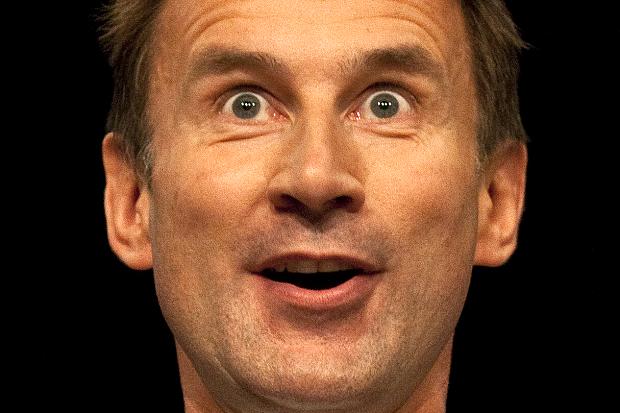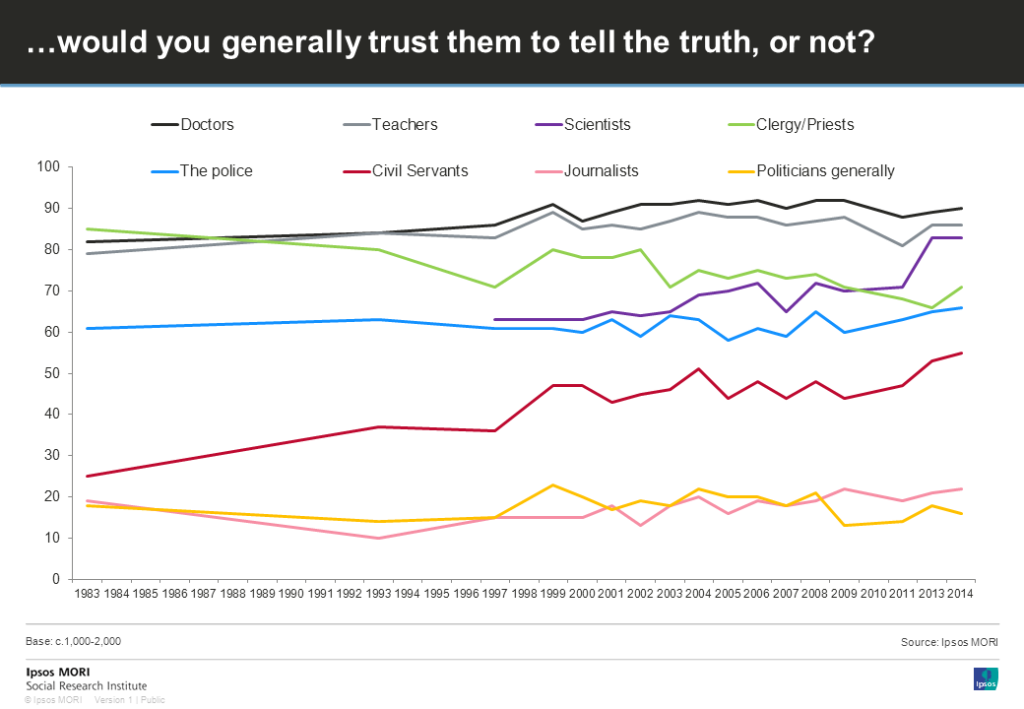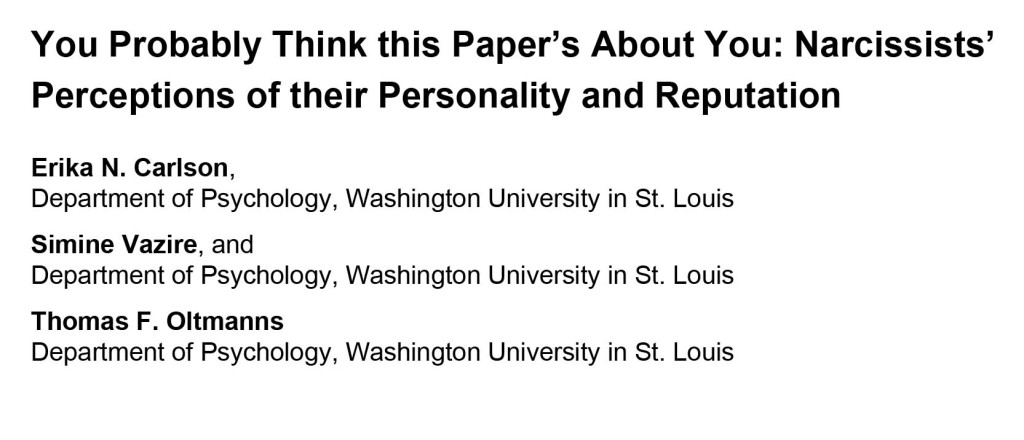In an article entitled ‘Why politicians must lie – and how selling ice creams is like an election campaign’, Warwick Smith comments that, “As a result, many politicians make this Faustian bargain; they sell their soul in order to prolong their political careers. They know that the best place to set up their ice-cream stall is right beside their political opponent, with just enough differences to identify them with the one side or other of the spectrum.”
Trust in politicians is generally pretty low, as this Ipsos MORI poll reveals.
Doctors remain clearly the most trusted profession, with 90% trusting them to tell the truth.
In the literature, there has been some discussion of whether people who love themselves, aka narcissists, have genuine belief in their own abilities and feel simply ‘misunderstood’?
The title of such a paper in the psychiatric research press is quite amusing.
Jeremy Hunt of course is not narcissistic. But narcissistic people tend to be completely oblivious to feedback – for example the worst A&E waits in history, or the worst NHS deficits in history.
I don’t think Jeremy Hunt is deliberately lying either – although a lie in law, a misrepresentation, can be through negligence, innocence or fraud.
But the track record of Hunt’s brushes with the truth are theoretically interesting, even though Jeremy Hunt is not a pathological liar.
Wikipedia defines ‘pathological lying’ as follows:
“‘Pathological lying (also called pseudologia fantastic‘ or Richard Townsend syndrome and mythomania), is a behavior of habitual or compulsive lying. It was first described in the medical literature in 1891 by Anton Delbrueck. Although it is a controversial topic pathological lying has been defined as “falsification entirely disproportionate to any discernible end in view, may be extensive and very complicated, and may manifest over a period of years or even a lifetime”. The individual may be aware they are lying, or may believe they are telling the truth. Sometimes however, the individual may be lying to make their life seem more exciting when in reality they believe their life is unpleasant or boring.”
Defining characteristics of pathological lying are provided.
“The stories told are usually dazzling or fantastical, but never breach the limits of plausibility, which is key to the pathological liar’s tactic. The tales are not a manifestation of delusion or some broader type of psychosis; upon confrontation, the teller can admit them to be untrue, even if unwillingly. The fabricative tendency is chronic; it is not provoked by the immediate situation or social pressure so much as it is an innate trait of the personality.”
There was the issue about the stroke deaths.
“A senior university academic has accused Jeremy Hunt of lying about the high rate of stroke deaths at weekends to justify forcing through changes to junior doctors’ working conditions. Professor David Curtis lambasted the health secretary for claiming patients were 20% more likely to die if they suffered the attack on a weekend.
“At the moment we have an NHS where if you have a stroke at weekends you’re 20% more likely to die,” Hunt had said on Tuesday, defending a move which sparked the walkout of more than 20,000 NHS workers over forced contract changes. “That can’t be acceptable.
But Curtis, who lectures at UCL’s Genetics Institute and has authored more than 100 reports on complex medical statistics, rubbished the claims in a stinging blogpost.”
“Fiona Godlee, editor in chief of The BMJ, has written to England’s health secretary, Jeremy Hunt, outlining concerns that he has misrepresented an academic article on deaths of patients admitted to hospitals at weekends.
Godlee said that Hunt had misused the findings of the Analysis article, published in The BMJ, and asked him to clarify statements that he had made in relation to it. She said, “I am writing to register my concern about the way in which you have publicly misrepresented an academic article published in The BMJ.”
Godlee said that the article, by Nick Freemantle, professor of clinical epidemiology and biostatistics at University College London, and colleagues, reported an analysis of 30 day mortality after admission to hospitals in England and found an excess number of deaths among patients admitted at weekends. It found that 11 000 more people die each year within 30 days of admission to hospital on Friday, Saturday, Sunday, or Monday than on other days of the week.
“What it does not do is apportion any cause for that excess, nor does it take a view on what proportion of those deaths might be avoidable,” Godlee said.”
“The NHS, already struggling to meet rising demand with a chronic lack of staff, has 70,000 fewer personnel working for it than ministers have previously believed, new official figures show. Its own data collection experts have found that the official head count of the number of people staffing frontline services, which was only produced in December, inflated its workforce. At the time, a total of 1,083,545 health professionals were said to be working in the 228 NHS trusts and 209 GP-led local clinical commissioning groups across England. But the NHS’s Health and Social Care Information Centre (HSCIC) now says that the true number was 1,014,218. That means the NHS had 69,317 fewer staff last September than the 1.1 million that ministers identified in December, including just over 15,000 fewer nurses, midwives and health visitors and 3,000 fewer doctors.”
Not 70k fewer NHS staff. Before “NHS” included CQC, HEE & NHSE etc, now data is split. Which is better. New results: pic.twitter.com/hAyiTBJwj1
— Shaun Lintern (@ShaunLintern) April 3, 2016
Wikipedia continues:
“The stories told tend toward presenting the liar favorably. The liar “decorates their own person” by telling stories that present them as the hero or the victim. For example, the person might be presented as being fantastically brave, as knowing or being related to many famous people, or as having great power, position, or wealth.”
Remember how Jeremy Hunt was glowing in his reputation of being ‘the bad guy’?
“I was talking to Ken Clarke yesterday and he was saying how he was pursued by nurses to the airport when he was going on holiday with his family – the BMA put up posters of him all over the country. I had a similar conversation with Norman Fowler and someone was telling me yesterday how Patricia Hewitt had the mums of junior doctors pursuing her everywhere she went,” he says.
Jeremy Hunt is not a pathological liar. Phew.
But then again – this doesn’t explain why he’s the most disliked British politician of any party? This sample is not confined to #juniordoctors or #ladydocs even.



